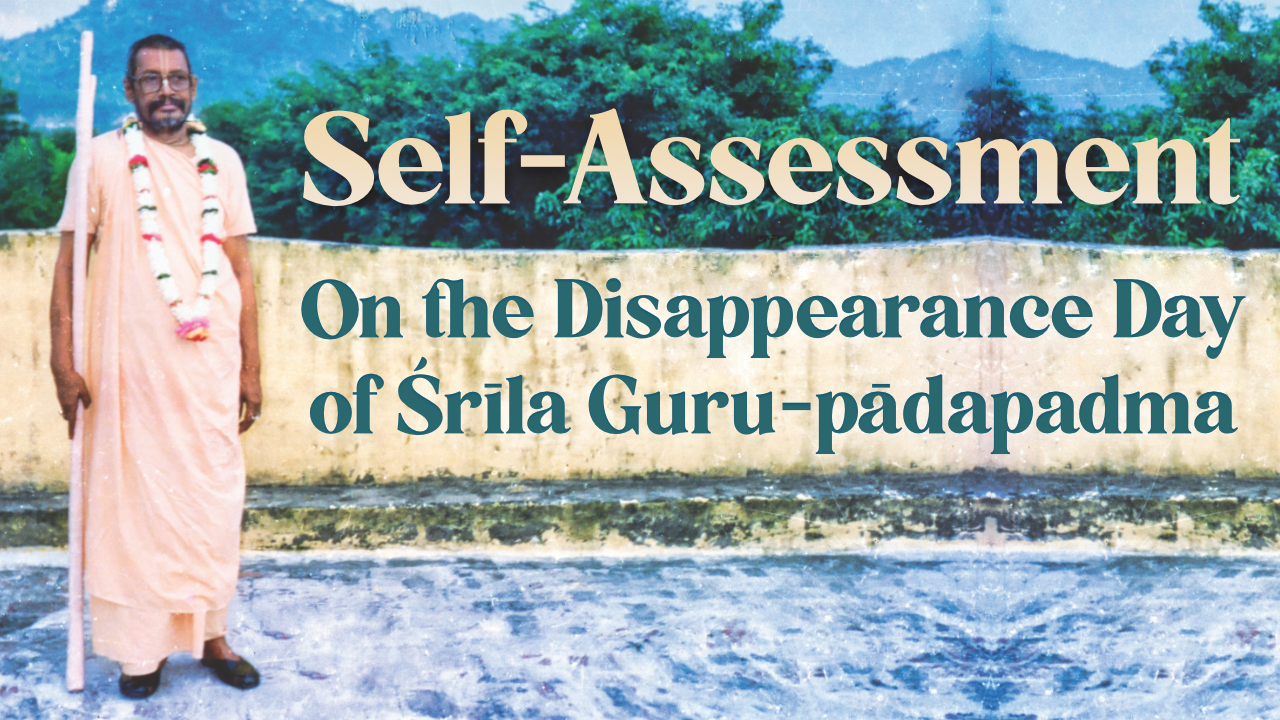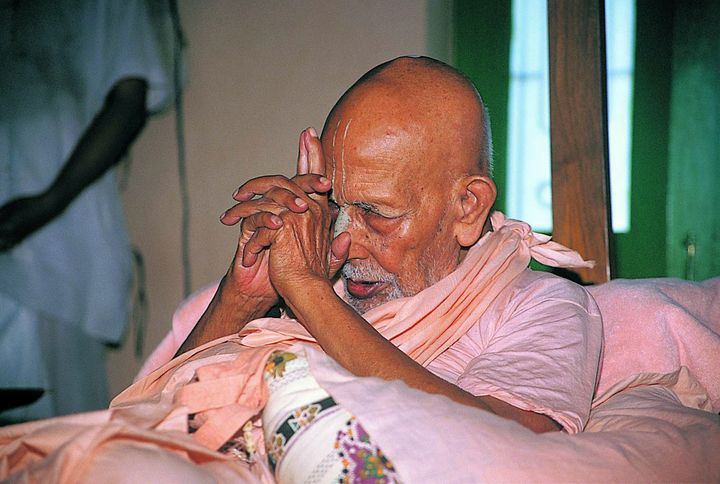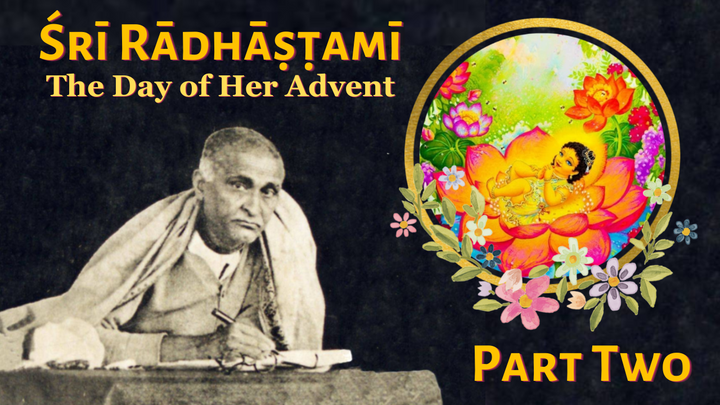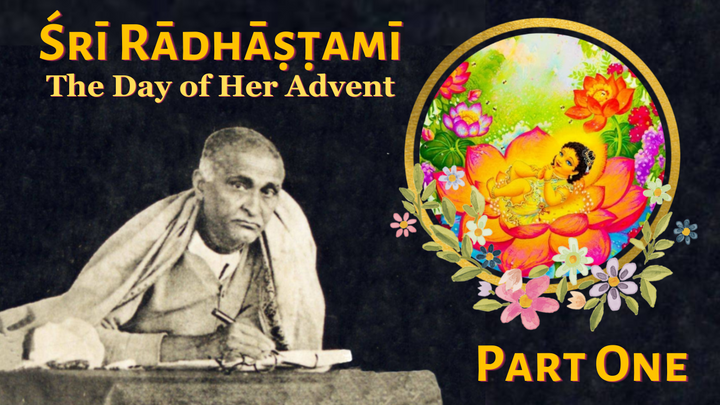Self-Assessment on the Disappearance Day of Śrīla Guru-pādapadma

by
Śrī Śrīmad
Bhaktivedānta Vāmana Gosvāmī Mahārāja
Excerpt from a lecture delivered on October 5th, 1998
Śrī Śyāmasundara Gauḍīya Maṭha, Siliguri (West Bengal)
Listen to the article read out by me here:
Never Forget Śrī Guru
Today’s special festival marks the beginning of the last month of our Cāturmasya-vrata. This last month of Cāturmasya is called Kārtika-vrata, Ūrja-vrata or Dāmodara-vrata. Since today is also śāradīya-rāsa-yātrā, Śrī Kṛṣṇa’s autumn rāsa-līlā, it evokes special remembrance of the disappearance day of our most worshipable Śrīla Guru-pādapadma, nitya-līlā-praviṣṭa oṁ viṣṇupāda aṣṭottara-śata-śrī Śrīmad Bhakti Prajñāna Keśava Gosvāmī Mahārāja. Therefore, as I begin my talk, I first pray to the lotus feet of Śrīla Guru-pādapadma for increasing enthusiasm in my sādhana-bhajana.
Today is the disappearance day of our gurudeva, the day on which we observe our separation from him. Although the appearance and disappearance days of those in our Gauḍīya guru-varga are of equal significance, the common man often thinks that he need only faithfully devote himself to his gurudeva as long as his gurudeva is physically present. He tends to forget his gurudeva when his gurudeva disappears from this world, or in other words, conceals his manifest pastimes. This inconsistency is vanquished by constant engagement in the service of Śrī Hari, Guru and Vaiṣṇavas. If they are the constant objects of our remembrance, it will not be possible to forget them. But if we have a motive to receive some temporary gain from them, we will easily forget them.
Forgetfulness of Bhagavān is the sole cause of all our miseries.
bhayaṁ dvitīyābhiniveśataḥ syād
īśād apetasya viparyayo ’smṛtiḥ
tan-māyayāto budha ābhajet taṁ
bhaktyaikayeśaṁ guru-devatātmā
Śrīmad-Bhāgavatam (1.2.37)
The jīva who is averse to Bhagavān forgets his own constitutional nature because of his association with māyā. Due to this forgetfulness, he becomes absorbed in the conception that he is the material body and thus thinks “I am a demigod,” “I am a human being”, etc. In this state of bodily identification, he fears old age, disease and so forth. Therefore those who know the truth should consider their own guru as īśvara, the Supreme. In other words they should see him as their master who is non-different from Bhagavān and who is very dear to Him.
Through exclusive devotion they should perform one-pointed worship of that īśvara, their guru.
Our faults and misfortune are the results of our forgetting Bhagavān and we will never be fortunate enough to remember Him as long as we are forgetful of śrī guru and the Vaiṣṇavas. Therefore, when we perform bhajana, it is imperative that we first remember śrī guru and the Vaiṣṇavas. First we must pray for their mercy; only then can we pray for service of Bhagavān Śrī Hari. The scriptures describe this to be the one and only process for remembering Him.
Śrī Guru – Our Constant Guide
As long as śrīla gurudeva is physically present we should desire to learn the process of sādhana-bhajana from him. But instead, we are more eager to know answers to questions such as: “How shall I maintain my life?”, “How shall I eat?” and “How shall I clothe myself?” For those who are true sādhakas, however, eating, sleeping and dressing are of no real importance. Such sādhakas only value that which pertains to sādhana-bhajana.
Śrīla gurudeva gives instructions such as, “You should chant the holy name”, “you should chant mantras, such as the gāyatrī-mantra; you should discuss devotional books and topics; and you should engage in the arcana and pūjā of the deity. Begin by performing sādhana-bhakti and try to advance gradually.”
At present we are ignorant and do not have correct conceptions ofsādhana-bhakti, bhāva-bhakti and prema-bhakti. If we did, we would be absorbed in contemplating them exclusively. Since that is not the case, what should we do?
deha-geha-kalatrādi-cintā avirata
jāgiche hṛdaye mora buddhi kori’ hata
hāya! hāya! nāhi bhābi—anitya e saba
jīvana vigate kothā rahibe vaibhava?
Kalyāṇa-kalpataru (Durlabha Mānava-janma 8–9)
by Śrīla Bhaktivinoda Ṭhākura
Anxiety for my body, house, wife and so forth constantly arises in my heart, thus destroying my intelligence. Alas, Alas! I do not understand them to be temporary. Do worldly comforts and opulences remain after death?
In this way the authors of the scriptures are telling us, and also the great Vaiṣṇavas (mahājanas) are making it known that this body is temporary. Still, we fail to proceed with caution.
Despite our lackings, we are to patiently keep trying. We have to continue following the instructions of Hari, Guru and Vaiṣṇavas; this is of utmost importance. We repeatedly hear about the same subjects, but our hearts and minds cannot retain what we have heard. And even if we do retain it, mere mental retention of information is of no real value. It is necessary to practice what we hear and live by it. Only then does what we hear take on any real significance. But despite hearing, hearing and more hearing, we all too soon tend to forget what we have heard.
Śrī Śiksāṣṭaka – the Complete Process
We often see that new comers to the path of sādhana-bhajana are enthusiastic, but as time goes by, they see it as ordinary and their eagerness wanes.
What method, then, is appropriate for us? How should we practise sādhana? Śrī Śikṣāṣṭaka, the instructions of Śrī Caitanya Mahāprabhu, was previously known as sādhana-patha, the path of sādhana. We may be on the path of sādhana, but we are forgetting that path. Why does such forgetfulness occur when daily we are reciting that same Śikṣāṣṭaka? Why do our enthusiasm and patience diminish? That it does, reveals that we are not performing sādhana with inner steadfastness.
Forgetfulness of the path of sādhana can also result from over-endeavour. We need to contemplate whether our forgetfulness is due to over-endeavour or lack of endeavour. Śrīman Mahāprabhu’s Śikṣāṣṭaka begins with “vijayate śrī kṛṣṇa-saṅkīrtanam – may the congregational chanting of Kṛṣṇa’s holy name be victorious!” And Śikṣāṣṭaka concludes with verses about weeping for Kṛṣṇa. Both the beginning and end of the process are given. But if I am a beginner to the path of sādhana, how can I cry? A person only cries when he is in need of something, something specific. Do we have any conception of our highest need?
Nothing Less than Absolute Happiness
“I want the mercy of śrī guru, the Vaiṣṇavas and Bhagavān.” Indeed, such contemplation nurtures the desire to attain my highest goal. How? Our guru-varga says that if we want to realize our highest aspiration, we should not limit our desire for it, as this will not help us attain it. Artha-śāstra (the Vedic scripture on material prosperity) instructs a person to place a limit on his aspirations for happiness. Why? “nālpe sukham asti bhūmaiva sukham – there is no happiness in this creation. This creation is full of limitations. The only abode of complete happiness is Bhagavān. In the realm of parama-artha, or supreme spiritual welfare, limitations have no value. We don’t have to be satisfied with the limited happiness of this world. If we are, we will be cheated.
If one accepts the statement, “bhūmaiva sukham – complete happiness is only found in Bhagavān” to be true, one must endeavour to attain it. The scriptures say, “yatne kṛte yadi na siddhati ko ’tra doṣaḥ – If, in spite of my efforts, I am still unable to attain Him, what shall I do? Where is my fault?” Who will judge whether or not I have made my best possible effort? Who will decide the extent of my eagerness for sādhana-bhajana? And who will make this known to me? This needs to be contemplated. A person must know how much endeavour is required to really attain success.
Measuring Our Progress
Jagad-guru Śrīla Bhaktivinoda Ṭhākura said, “Every fifteen days, on each Ekādaśī, a person should record how much progress he has made in his performance of sādhana-bhajana.” But we do not do that. And should that record be kept on a piece of paper or within our hearts? Only by recording it in our hearts will we be able to analyse our progress. Every Ekādaśī a person should make a point to ‘record’ how much harināma he did in the last fifteen days, how much time he spent discussing śāstra and how much service he engaged in. Only then can he understand whether he is making progress or whether he is going backwards.
Sometimes, when we hear a certain siddhānta, we may become disheartened.
nitya-siddha kṛṣṇa-prema ‘sādhya’ kabhu naya
śravaṇādi-śuddha-citte karaye udaya
Śrī Caitanya-caritāmṛta (Madhya-līlā 22.107)
Kṛṣṇa-prema (being eternally present in the heart of the jīva) is never acquired elsewhere. Hearing, chanting and remembering the pastimes of Kṛṣṇa purifies the heart and thus kṛṣṇa-prema naturally awakens.
Upon hearing what is required to attain my goal, I wonder if I will ever be successful, my enthusiasm begins to wane and I begin to doubt the strength of my determination. The Absolute Reality cannot be attained if this doubt persists. Śrīla Parīkṣit Mahārāja listened to ample hari-kathā, and his conception of what was required of him in the line of devotion remained strong. Now, if our own conception becomes weak, we must simply move forward from whatever point we have reached in our hearing, learning and practising.
Our constant concern is whether or not we are capable of following all the instructions the Gauḍīya Vaiṣṇavas have given us. More importantly we wonder if we have really taken these instructions to heart, or are endeavouring to understand them.
We all know that where there is a will there is a way. We then note that although we desire to practise properly, we are not successful. But is this really the case? If we have an ardent desire and if we are honest and non-duplicitous then most definitely we will achieve success. We should question, “How much effort am I putting into my practices? And to what extent do I try before I consider my endeavour in sādhana to be complete? What I may perceive as the end of my efforts in the realm of sādhana-bhajana may actually be the very beginning.” This process is not necessarily easy.
Life’s Only Treasure
Śrī Caitanya Mahāprabhu Himself said:
ki kāja sannyāse mora, prema prayojana
dāsa kori deho more vetana prema-dhana
What value is sannyāsa to Me? My only goal is prema. Therefore, O Bhagavān, please accept Me as Your servant and award Me the salary of prema.
Does this ever enter our minds? The scriptures state, “pañcaśordhvaṁ vanaṁ vrajet – after the age of fifty, one should proceed to the forest for the purpose of performing hari-bhajana.” At that time of life, one’s exclusive dedication should be the development of devotion to Śrī Hari. From the perspective of Śrī Prahlāda Mahārāja, however, one should not wait until one has turned fifty. If we anticipate that our duration of life will be one hundred years, fifty years are spent simply sleeping. And if one’s life lasts for fifty years, twenty-five go by in this way. Therefore, in the remaining half of our lives, we must become one-pointed in our sādhana-bhajana.
Those who have had some realization will never reveal it to anyone. Why not? Such realization is parama-artha, the topmost treasure, and therefore should not be disclosed. And those who tell others about the treasure they have gained are like poverty-stricken people who boast the amount of rupees in their possession, when in actuality, their wealth is insignificant. Those who are intelligent never wander here and there telling others about their topmost wealth. You can be led into trouble simply by speaking.
Śrīmad-Bhāgavatam says, “It is difficult to earn money, it is difficult to save money and it is painful to spend money.” But the outcry of so many of us is solely for the possession and control of money. And when asked, “For what?” we answer, “For the service of Hari, Guru and Vaiṣṇavas. After all, we are their servants; this is stated in the scriptures.” But what understanding do we actually have of this?
One should first learn and understand Śrī Caitanya Mahāprabhu’s teachings – the tattva and siddhānta of Śrī Caitanya-caritāmṛta. Without such understanding, we will not be able to perform sādhana-bhajana, in which the first, essential step is to understand what is beneficial to our bhajana and what is not. However, simply attaining this knowledge is insufficient. One must, in this very life, practise what one has learned.
Translated from Śrī Gauḍīya Patrikā, Year 56, Issue 11
by the Rays of The Harmonist team.
Published in English for the first time in
Rays of The Harmonist No. 15 Kārtika 2005



Comments ()